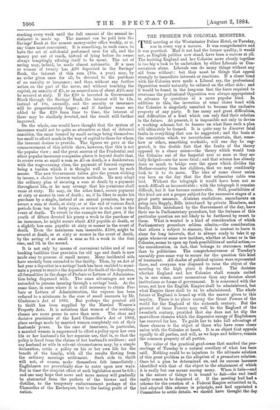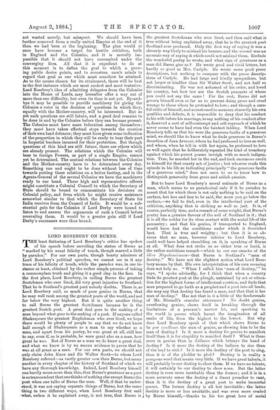THE PROBLEM FOR COLONIAL MINISTERS.
THE meeting at the Westminster Palace Hotel, on Tuesday, was in every way a success. It was comprehensive and it was practical. Had it not had the former quality, it would not, as English politics now stand, have been a success at all. The knitting England and her Colonies more closely together is too big a task to be undertaken by either Liberals or Con- servatives alone. Liberals can do many things without any aid from without ; but they must be things that appeal strongly to immediate interests or emotions. If a closer bond with the Colonies were made a Liberal cry, the professional Opposition would naturally be enlisted on the other side ; and it would be found in the long-run that the force required to overcome the professional Opposition was always appropriated in advance by questions of a more popular kind. In addition to this, the invention of some closer bond with the Colonies is singularly unsuited to become the exclusive property of any party. It has many and great difficulties, and difficulties of a kind which can only find their solution in the future. At present, it is impossible not only to devise a working scheme, but to foresee on what lines such a plan will ultimately be framed. It is quite easy to discover fatal faults in everything that can be suggested ; and the basis of the conviction which we nevertheless entertain, that some- how or other, something workable, will one day be sug- gested, is the double fact that the faults of the theory opposed to a closer union—the theory which would turn the Colonies out of the Imperial nest so soon as they are fully fledged—are far more fatal ; and that science has already done so much to bridge over the space which divides the Mother-country from her children, that we may confidently look to it to do more. The idea of some closer union was born on the day that the first submarine cable was laid. Without the telegraph it would have been not BO much difficult as inconceivable ; with the telegraph it remains difficult, but it has become conceivable. Still, possibilities of this kind are not a proper subject for the successive stages of a great party measure. Abstract resolutions, amendments oa• going into Supply, Bills introduced by private Members, and finally, Bills introduced by the Government of the day, have their use in Parliamentary procedure, but the fortunes of this particular question are not likely to be furthered by resort to them. What is wanted is a kind of consideration of which Parliamentary procedure seldom admits,—the consideration that allows a subject to simmer, that is content to leave it alone for long intervals, that is always ready to take it up again whenever some new incident, whether at home or in the Colonies, seems to open up fresh possibilities of useful action,— the consideration, in fact, that belongs to statesmen rather than to politicians. The comprehensiveness of Tuesday's assembly goes some way to secure for the question this kind of treatment. All shades of political opinion were represented there, and everyone was disposed to raise the object of the meeting to the high place it deserved. The decision whether England and her Colonies shall remain united is, in one sense, more momentous than any decision about institutions or forms of government. It is concerned with the issue, not how the English Empire shall be administered, but what Empire there shall be to be administered. The whole future of England is bound up with the answer given to this inquiry. There is no place among the Great Powers of the world for the England of the sixteenth century. But the greatest of those Powers may well be the England of the twentieth century, provided that she does not let slip the marvellous chances which the dispersive energy of Englishmen has reserved for her. To guide her to take full advantage of these chances is the object of those who have some closer union with the Colonies at heart. It is an object that appeals equally to all parties, and will, as we hope and believe, remain the common property of all parties.
The value of the practical good-sense that marked the pro- ceedings of Tuesday is a natural corollary of what has been said. Nothing could be so injurious to the ultimate solution of this great problem as the adoption of a premature solution. Once let a plan be determined on, and its success becomes identified with that of the object to the attainment of which it is really but one means among many. When it fails—and in the nature of things it is bound to fail—the end itself easily comes to be despaired of. If the meeting had had a scheme for the creation of a Federal Empire submitted to it, had adopted this scheme in principle, and had appointed a Committee to settle details, we should have thought the day not wasted merely, but misspent. We should have been further removed from a really united Empire at the end of it than we had been at the beginning. The plan would at once have become a target for hostile criticism, both in England and the Colonies, and it is morally im- possible that it should not have succumbed under the converging fires. All that it is expedient to do at this moment is to define the goal to which a grow- ing public desire points, and to accustom men's minds to regard that goal as one which must somehow be attained. As to the means chosen for its attainment, those will be best in the first instance which are most modest and most tentative. Lord Bosebery's idea of admitting delegates from the Colonies into the House of Lords, may hereafter offer a way out of more than one difficulty, but even its time is not yet. By-and- bye it may be possible to provide machinery for giving the Colonies a voice in the decision of questions in which they, equally with the Mother-country, will be interested. But as yet such questions are still future, and a good deal remains to be done in and by the Colonies before they can become present. The Colonies must have more federation among themselves ; they must have taken effectual steps towards the creation of their own land defences ; they must have given some indication of the proportion in which they will be ready to bear their part in Imperial burdens incurred for their protection. But though questions of this kind are still future, there are others which are already present. The relations which the Colonies will bear to foreign Powers, as part of a single Empire, cannot yet be determined. The mutual relations between the Colonies and the Mother-country have to be determined every day. Something can and ought to be done without loss of time towards putting these relations on a better footing, and in the -Agents-General of the several Colonies we have the machinery ready to our hand. These high and representative officers might constitute a Colonial Council to which the Secretary of -State should be bound to communicate his decisions on Oolonial policy, and from which he might receive assistance somewhat similar to that which the Secretary of State for India receives from the Council of India. It would be a sub- stantial gain for the Colonies if Lord Derby were bound to listen to and answer the arguments of such a Council before overruling them. It would be a greater gain still if Lord Derby's successors were thus bound.



































 Previous page
Previous page